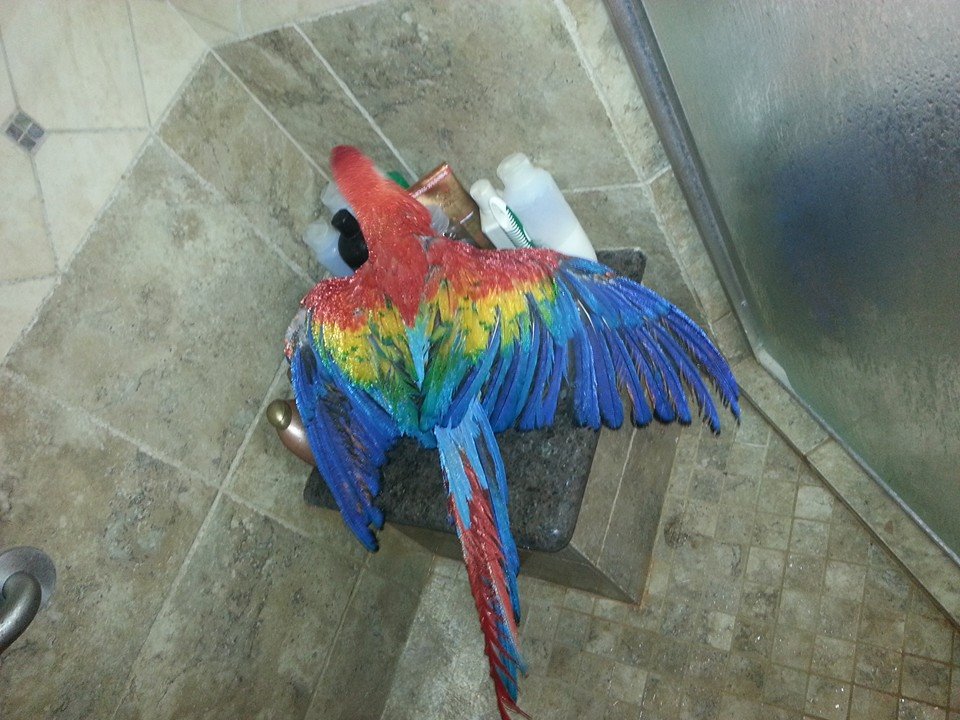Tucson Parrot Rescue
Call us: (520) 747-0554
Parrot Care
Nutrition
Parrots need a well balanced diet to avoid vitamin deficiencies leaving them susceptible to illness and disease and shortening their lifespan.
They need clean water & their bowls need to be cleaned at least daily.
Some choose bottled water but there should be minerals in it.
Pelleted diets are balanced versus a seed diet that is high in fat. Colored pellets should be avoided. Harrison’s organic bird pellets are well accepted though Totally organic pellets is another excellent food. Roudybush, Lafeber, Scenic, Exact, Zupreen are other brands but are not as high quality, nor organic, but still much better than a seed only diet.
You can purchase Harrison’s pellets in Tucson at:
Acacia Animal Hospital 308-4225 4205 N. Campbell Ave.
Valley Animal Hospital 748-0331 4984 E 22nd St.
Az. Feed Store (NW location only)
Vegetables, especially dark leafy green and orange vegetables should be fed often along with some fruits. Use seasonal produce to change their diet. Most thin skinned produce should be organic. Here are the 12 with the most pesticides, so they should ONLY be organic.
1. Apples
2. Celery
3. Strawberries
4. Peaches
5. Spinach
6. Nectarines (imported)
7. Grapes (imported)
8. Sweet bell peppers
9. Potatoes
10. Blueberries (domestic)
11. Lettuce
12. Kale/collard greens
A sprout mix is a very healthy option especially to help convert a seed eater; not the sprouts you find in a store but seed mixes that sprout from Chinaprairie or Totally organic pellets.
Enriched whole wheat or veggie pasta, brown rice, oatmeal, barley, millet or quinoa are also enjoyed cooked & served warm especially in the winter. Lightly toasted whole wheat bread can be another treat along with air popped popcorn. Caitec oven bites are also a very healthy treat.
Foods to avoid - caffeine, salt, greasy foods, avocado, peanuts especially in a shell, cracked corn.
Showers -
Parrots usually love to take showers, either with you when you take yours or with a spray bottle. If you use a spray bottle, set it to a fine mist and aim it just above the bird not at its face. In general parrots need a shower AT LEAST once a week. Small birds such as cocktials and conures enjoy a small bowl of water for bathing.
Toys -
Parrots, especially those shut up in their cages for many hours per day, need toys. We recommend that you give your bird a new toy once a month, and more often if possible. Chew toys made of untreated wood are helpful in preventing beak overgrowth. Parrots often love very simple homemade toys - for instance, many birds love to chew up strips of cardboard.
Outside Time -
Parrots will be healthier when exposed to outside time. Besides fresh air, they need UV light to help with vitamin & mineral absorption and all windows block that. Care needs to be taken that they cannot escape an outside cage, though & only when you are home so you can monitor them, better yet stay out side with your birds.
Vet Care -
Parrots should be checked by a avian vet as they hide illness very well.
Sleep -
Parrots need 10 to 12 hours of undisturbed sleep.



